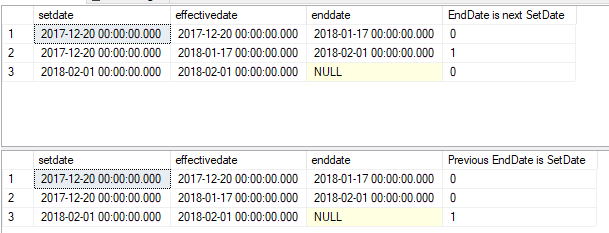Hi there,
In my query results below I have returned three rows of data - what I want to do is say
If EndDate (Row 2) = SetDate (Row 3) then 1 else 0
I cant for the life of me work out how to do it. Any help would be gratefully received.
SetDate EffectiveDate End Date
2017-12-20 00:00:00.000 2017-12-20 00:00:00.000 2018-01-17 00:00:00.000
2017-12-20 00:00:00.000 2018-01-17 00:00:00.000 2018-02-01 00:00:00.000
2018-02-01 00:00:00.000 2018-02-01 00:00:00.000 NULL
In my query results below I have returned three rows of data - what I want to do is say
If EndDate (Row 2) = SetDate (Row 3) then 1 else 0
I cant for the life of me work out how to do it. Any help would be gratefully received.
SetDate EffectiveDate End Date
2017-12-20 00:00:00.000 2017-12-20 00:00:00.000 2018-01-17 00:00:00.000
2017-12-20 00:00:00.000 2018-01-17 00:00:00.000 2018-02-01 00:00:00.000
2018-02-01 00:00:00.000 2018-02-01 00:00:00.000 NULL

